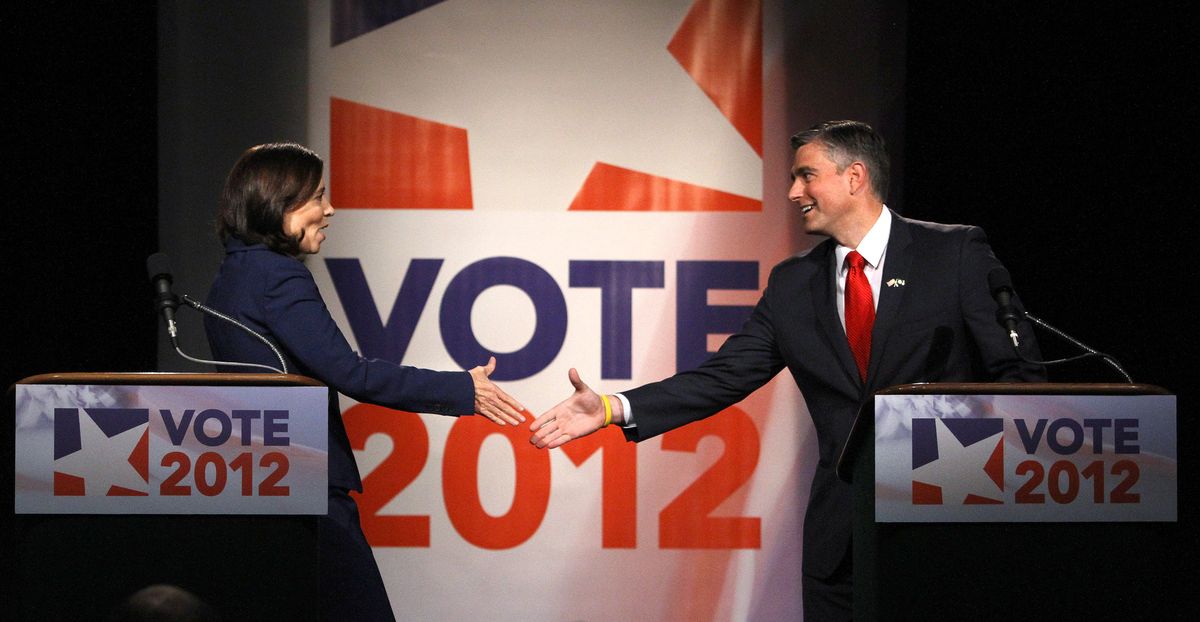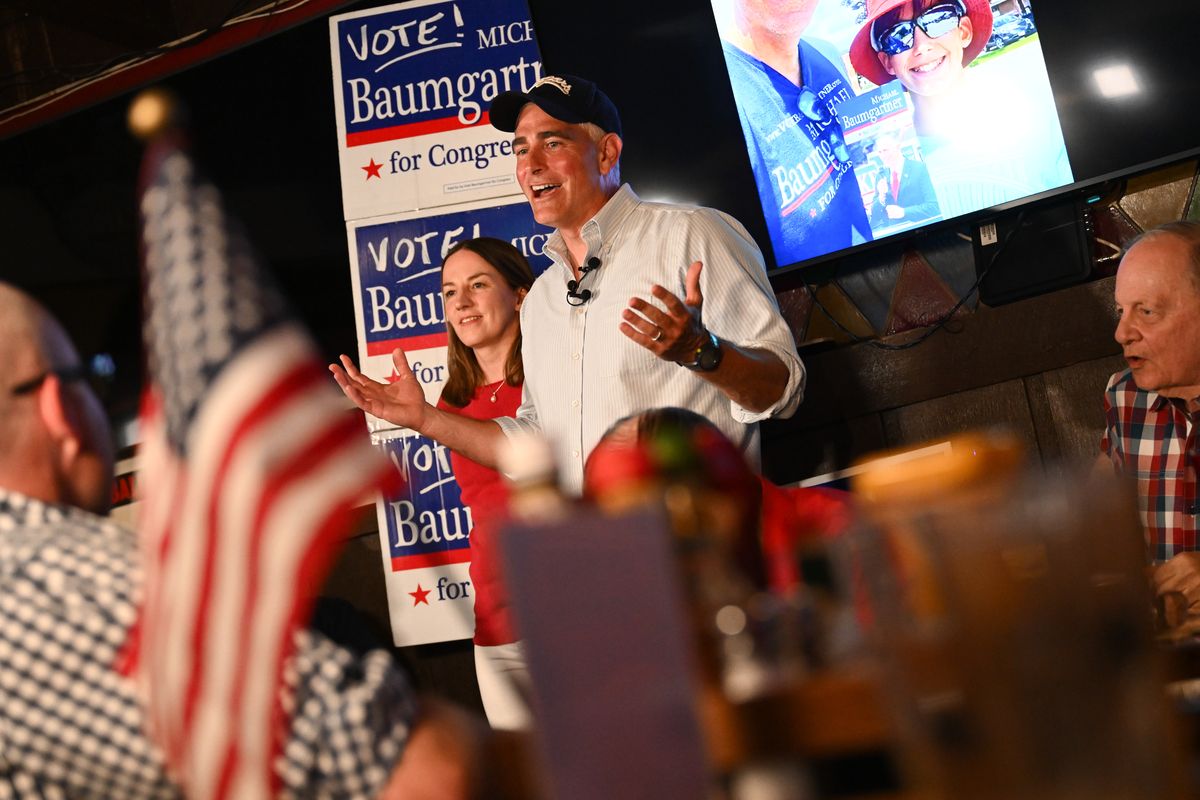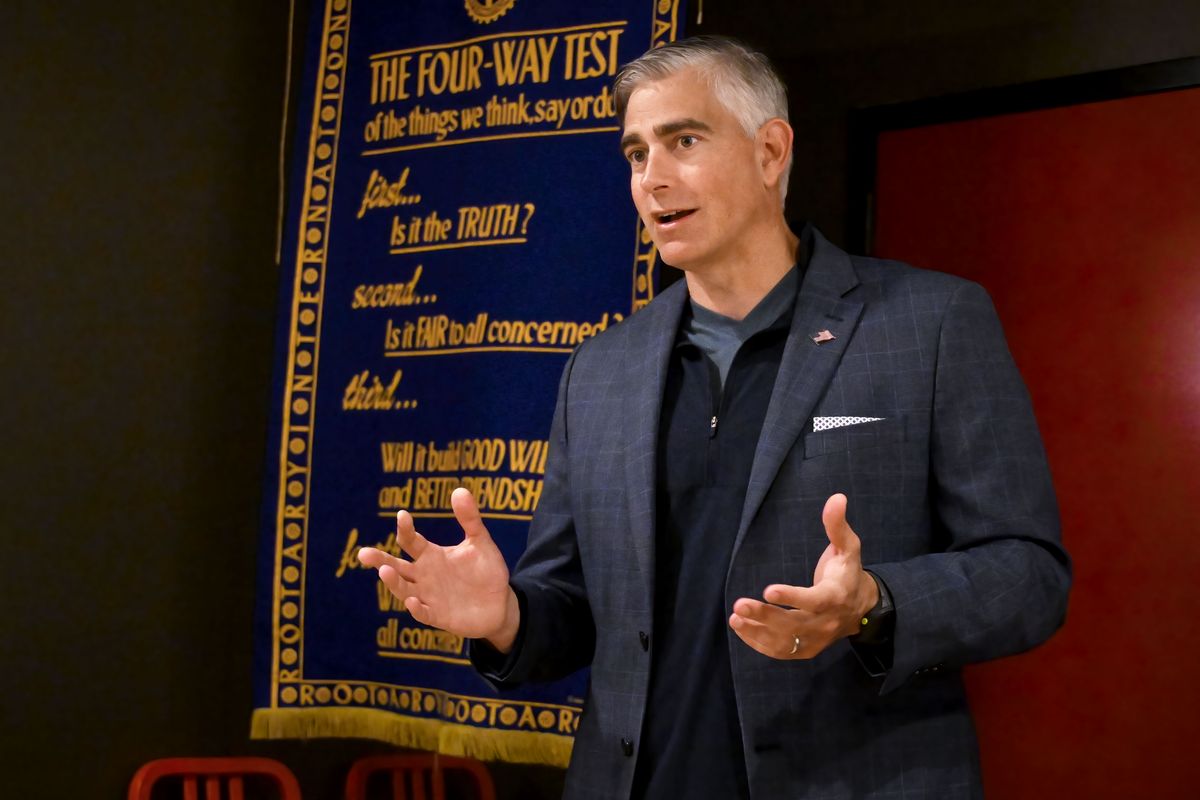How Michael Baumgartner became the frontrunner to be Eastern Washington’s next Congressman
Republican congressional candidate Michael Baumgartner, who currently serves as Spokane County treasurer, speaks during a primary election party with his wife Eleanor Baumgartner at his side after their campaign secured the Republican party nomination on Aug. 6 at The Swinging Doors in Spokane. (TYLER TJOMSLAND/THE SPOKESMAN-REVIEW)
The political career of Michael Baumgartner may have begun with an email newsletter.
Baumgartner, the Spokane County treasurer, is the frontrunner to be Eastern Washington’s next congressman. It’s the kind of higher office he has seemed headed for since 2010, when he won a state Senate seat in his first run for office in what then was the most expensive legislative race in state history.
In 2007, as the United States boosted troop numbers in an attempt to stabilize Iraq, Baumgartner was serving as deputy director of the Joint Strategic Planning and Assessment Office in the U.S. Embassy in Baghdad, where his duties ranged from disrupting the grip of an Iranian-backed militia on domestic cooking fuel supplies to co-authoring a paper analyzing what a sudden withdrawal from Iraq would entail.
Baumgartner had been around the world by then, having served on a Jesuit mission in Mozambique, studying forests in Siberia, working as an economic policy adviser for the Crown Prince of Dubai and as a senior vice president for a Saudi telecom company.
As criticism for America’s invasion and continued presence in Iraq mounted, Baumgartner felt he was seeing another side of the story, the on-the-ground work of American soldiers and diplomats trying to stabilize the country and institute a democracy – an effort that Baumgartner says, in hindsight, was in many ways misguided but still a noble effort.
The newsletter was an informal effort, but it gained traction.
“I just was laying out what I was seeing, all these great Americans I was working with and what we were trying to do, and I just saw how terrible Al-Qaida and Jaysh al-Mahdi were… and that email started getting read,” Baumgartner recalled.
He met Boston Globe columnist Kevin Cullen during a luncheon at Harvard University, and the writer took an interest in Baumgartner’s emails. In a 2008 column, Cullen lambasted the tell-all book by former White House Press Secretary Scott McClellan, whose “inside account of the misguided and cynical effort by the Bush administration to drag a nation into war” had only exposed the lies that Cullen believed McClellan helped peddle.
A book Cullen said he’d prefer to read: one written by “a young man with a little more courage and a lot more character … Michael Baumgartner.” He praised Baumgartner’s focus on the future, rather than the past, juxtaposing him an “architect of hope” compared to “authors of disaster” like McClellan. This was the description that caught the attention of Republican groups back in Washington state, Baumgartner said, that would eventually encourage him to run for office.
First, Baumgartner took a job as a civilian contractor for Civilian Police International, an organization working under the State Department to train police in Afghanistan. He was living in Helmand province, where he would meet his future wife, Eleanor, and worked on a project she helped design to encourage the region’s opium poppy farmers to switch to growing food.
This entailed providing wheat seeds and pomegranate saplings, but also posters conveying that “if you grow poppy, you’re going to burn up in hellfire,” Baumgartner recalled.
When he returned to Washington state in 2010, he was planning a trip with Eleanor “to see if we actually like each other” – they now have five children together – when he was approached by David Condon, who would soon be elected Spokane’s mayor. Chris Marr, a local two-term Democratic state Senator, was running for re-election, and Condon believed Baumgartner was the man to beat him.
A shifting party
When Baumgartner first ran for office in 2010, successfully unseating Marr in what was then the most expensive state legislative race in history, he had the backing of Republican establishment figures like Condon and future Senate Majority Leader Mark Schoesler but remained on friendly terms with more radical elements of his party.
In order to secure the endorsement of the Spokane County GOP, he signed a pledge to support their newly adopted platform calling for a number of controversial policy goals, including the end of no-fault divorce, the privatization of Social Security, a return to the gold standard, withdrawal from the United Nations and the World Trade Organization, and for the federal government to cede land in the west to the states.
But when Baumgartner was pressed on the particulars, he initially told The Spokesman-Review he was unfamiliar with some of the issues in the platform, such as a call to repeal the state’s Growth Management Act. In the case of no-fault divorce, which allows for a marriage to be dissolved by a single party and without proving wrongdoing, he said he wasn’t prepared to take a stance either way.
Johnathan Curley
After the primary was over, he was prepared to take a stance counter to the platform. He didn’t support repealing the Growth Management Act, he said in a subsequent interview, but did think it should be reformed. He rejected ending no-fault divorce.
Marr attacked Baumgartner for saying one thing to win his party’s support and then another to moderate for the general election. Then-state Rep. John Ahern, R-Spokane, was a clearcut supporter of the platform, and expressed that signing the platform pledge was important for a clear reason.
“The voters want to know exactly where you stand,” Ahern said. “They don’t want you to be wishy-washy.”
Victorious in the 2010 election, Baumgartner the next year stood shoulder-to-shoulder with conservatives from the ascendant tea party wing of the GOP to celebrate a major blow to government unions in Wisconsin, though he did not consider himself a member of the tea party.
Fast-forward more than a decade, and a new faction of the Republican Party has risen nationwide and in Spokane County, one molded in the image of former President Donald Trump and distinctly more suspicious of Baumgartner.
Now running for Congress, Baumgartner wasn’t the county GOP’s first choice. Or second choice. Or third choice. He was given good marks for his experience and communication skills, and the party’s vetting committee wrote in a since-removed summary that he “looks great on paper” but seemed “polished but not genuine.”
The committee added that Baumgartner had a “trust issue” when it came to the Constitution and the party’s platform, which had just been revised for the first time in a decade and now included, among other things, questioning the integrity of elections and supported hand-counted ballots.
In a June debate, most of the Republicans still in the race called into question whether Trump had been fairly beaten in the 2020 election. Spokane City Councilman Jonathan Bingle, on the other hand, definitively rejected Trump’s claims that voter fraud cost him the election.
Baumgartner agreed that Biden was legitimately elected but blamed the “sense of unfairness” in the election system on the system itself, pointing to things like mail-in voting.
Baumgartner fared no better at the state GOP convention, when delegates from across the district voted to endorse Ferry County Commissioner Brian Dansel, a former Trump appointee. Baumgartner, who had earlier in the afternoon been the first Republican candidate to attack the others during a public forum, wasn’t among the top three choices of the state Republicans.
In an October interview, Baumgartner argued that he had more easily gotten along with the tea party because “fiscal responsibility was really the driving force” of that movement, while the base of the Republican Party today is now animated by “the personal charisma of Donald Trump.”
“I’m supporting President Trump in the election, and we’ll hopefully get the chance to work with him, but, you know, I want us to be a party of ideas, not people, certainly, and I think that’s where the party has been,” Baumgartner said.
He also conceded that he’s no longer a fresh face in politics, and that the party under Trump is distinctly more wary of career politicians.
While grassroots members of the party expressed skepticism this election cycle, Baumgartner has continued to have the strong financial backing of business and real estate interests, outraising all of his Republican opponents combined. State party leadership also offered a modicum of support to Baumgartner prior to the endorsement of Dansel, though Baumgartner declined the offer.
He easily defeated his Republican rivals, taking the top spot in the August primary. Baumgartner now says the party has united behind him.
What does he believe?
While some in the Republican Party have criticized Baumgartner for refusing to draw lines in the sand, others, like state Sen. Mark Schoesler, R-Ritzville, argue he is better than most at building coalitions and negotiating a compromise.
“I’ve had people melt down if they don’t get their bill exactly,” said Schoesler, who served as the Republican leader of the Senate from 2015 to 2020 and helped recruit Baumgartner for his first legislative race.
Baumgartner initially rejected proposals in 2014 to raise gas taxes, but later supported an increase that included transportation funding reforms, a decision that he was criticized for by the right at the time and during the primary campaign.
“Not everybody in our caucus really wanted to do it, but we had leaders like Mike,” Schoesler said.
After Republicans took the majority in the state Senate, Baumgartner also led efforts to halt the rapid rise of college tuition, successfully lobbying in 2014 with others in the Legislature for a freeze on tuition increases and helping lead the effort in 2015 to pass a budget that cut four-year college tuition by 15-20%.
When former Washington State University president Elson S. Floyd proposed opening a new medical school in Spokane, Baumgartner was initially skeptical, but backed the proposal after a feasibility study was done.
“Isn’t that what an intelligent person would do?” Schoesler said in an interview. “You express a healthy skepticism, but when the study shows that it could work, you accept it.”
Schoesler praised Baumgartner for not fighting to have his name on the version of the bill creating the medical school.
“Some people get really hung up on (being a bill sponsor),” Schoesler said. “Baumgartner said, no, let’s go with (state Rep. Marcus) Riccelli’s House version. He didn’t let ego get in the way of that goal.”
On the campaign trail this year, Baumgartner claimed credit for funding the North Spokane Corridor and for bringing a medical school to Spokane.
On his campaign website, Baumgartner also touts that his “Drain the Swamp” legislation eliminated five government agencies to reduce bureaucratic waste.” This refers to one of his first major pieces of legislation, which consolidated five agencies into three. The most significant shakeup involved moving the state Department of Information Services and the Department of Printing into the Department of General Administration, which was renamed the Department of Enterprise Services. Some of the functions of these agencies were spun off into their own agencies.
While arguably different than “eliminating” those agencies, this move did include a major reduction of the state workforce in some cases. This was particularly so for the printing office, which already was shrinking due to digitization, though the process was sped up by Baumgartner’s legislation.
The bill also called for the state to periodically consider various functions that could be outsourced to the private sector, which had some success, including by reducing the state’s in-house website management and mail services. Baumgartner argued Gov. Jay Inslee’s election in 2012 minimized that legislation’s success, and in 2018 the state ceased examining its offices for duties that could be privatized.
One of the central themes of Baumgartner’s political career has been his opposition to unions. Notably, the Washington State Labor Council, which represents hundreds of local unions in the state, endorsed only one Republican for Congress this year: state Rep. Jacquelin Maycumber, one of Baumgartner’s chief Republican rivals in the primary this year.
Baumgartner fought unsuccessfully to prevent the state Department of Enterprise Services from being able to unionize and pushed a “right-to-work” law that would have weakened private and public sector unions. Greg Beeman, who represents Spokane County’s largest union with members in the county treasurer’s office, noted that Baumgartner “refuses to put his signature” on the union’s contracts, though union members otherwise believed Baumgartner was doing a “reasonable job” as treasurer.
Baumgartner said the signature was essentially ceremonial and didn’t affect the contract’s ratification, adding that he believed his staff should get paid more as they are paid less than in other counties. However, he isn’t shy about his views broadly on public sector unions.
“At a basic level, I don’t think public sector employees should be unionized,” Baumgartner said. “They tend to cost the public much more, and they have to provide less good service than otherwise.”
Baumgartner noted that both of his parents were public sector union members, his father working as a forestry professor at WSU and his mother working as a kindergarten teacher, and said he believes “most public sector employees are fantastic people.” But he believes unions broadly prevent merit-based promotion and employment and cost more for taxpayers.
‘An insurgent-type mindset’
Convincing opium farmers that they were going to burn in hell was not the last time that Baumgartner would try to make his point with colorful language.
In 2013, displeased at recent rulings from the state Supreme Court, Baumgartner introduced legislation that would shrink that court from nine judges to five. The bill would have had the judges learn which were to lose their jobs by drawing straws.
In 2016, reporter Daniel Walters penned a profile of Baumgartner as a legislator known for negotiating with his opponents, but also for insulting them.
In 2018, Baumgartner introduced a bill proposing the state celebrate Governor Jay Inslee Integrity Day – on April 1, or April Fools’ Day. Notably, while many bills are sped through on the floor of the Senate, this bill was read in full.
“When you’re trying to make a point, you want to color in bright, bold letters, you know?” Baumgartner said in an interview. “And I’ve always felt that the best defense in Olympia was to go on offense … that gives you sometimes some space, underneath it, to have some negotiation.”
But the first time he found himself in the headlines for throwing stones, it was not cloaked in humor and evidently not intended to get his name in the paper.
During Baumgartner’s unsuccessful 2012 run for U.S. Senate against incumbent Sen. Maria Cantwell, he lobbied reporters to make withdrawal from Afghanistan a key point in the election. Seattle reporter Josh Feit asked Baumgartner to respond to the comments of Todd Akin, a Republican congressman running for Senate, who had said that women’s bodies would naturally reject a pregnancy in the case of rape.
Baumgartner called Akin’s comments “ignorant” and “stupid,” Feit wrote, but like Akin opposed abortion in the case of rape. Baumgartner reportedly expressed frustration to Feit in the interview that abortion had dominated the election, while Afghanistan and American soldiers continuing to die there had largely been off the radar.
In a follow-up email that night to the reporter, Baumgartner attached a photo of himself next to a Navy Seal he had met in Afghanistan who died there a week before the interview.
“Take a good look and then go (expletive) yourself,” Baumgartner wrote.
After Feit published an article noting Baumgartner’s response, Baumgartner’s campaign released a statement that quoted Baumgartner as apologizing for his “strong language.” Today, Baumgartner says that his campaign put out the apology on his behalf, “which I did not feel was warranted given the circumstances.”
At the time, a number of articles were written that appear to at least partially vindicate Baumgartner, including a column by former Spokesman-Review columnist Shawn Vestal arguing that Afghanistan should, in fact, have been more of a central theme in media coverage of the campaign. Baumgartner un-apologized and “decided to embrace the email,” former Tacoma News Tribune columnist Peter Callaghan wrote at the time.
“Rather than diminish an already diminished campaign, the F-Baum Incident triggered some sympathetic press coverage when any coverage at all would have been welcome,” Callaghan wrote. “And Baumgartner surely realized that he needed to go gonzo to get more.”
Baumgartner stressed in a recent interview that his email was not an attempt to elevate his 2012 campaign, and he largely declined to “rehash that tragedy.” He also rejected that it was part of his evolution as a lawmaker willing to embrace the “gonzo” to make his political points.
He argued that he is not a member of a class of politician he believes has been on the rise in recent years, ones who are “purely bombastic,” throwing bombs without an end goal in mind.
“I don’t particularly have an interest in being one of those folks,” he said. “But as a member of Congress, I think I’ll be able to draw attention to issues that I want to fight for, and I think I’ve demonstrated the ability to do that.”
This kind of strategy has been useful as a Republican from Washington state, he argued, as Republicans are usually in the minority. He hearkens to his days in Afghanistan and perhaps the class he co-taught with former WSU football coach Mike Leach, “Leadership Lessons in Insurgent Warfare and Football Strategies,” as he described the political environment and what it takes to succeed.
“As a conservative Republican in a Democrat-dominated state, I just really think about it as an insurgent-type mindset,” he said. “It’s kind of like being a Coug, like Mike Leach in football – if you have two- and three-star recruits, how do you devise an offensive system to go beat five stars?”







